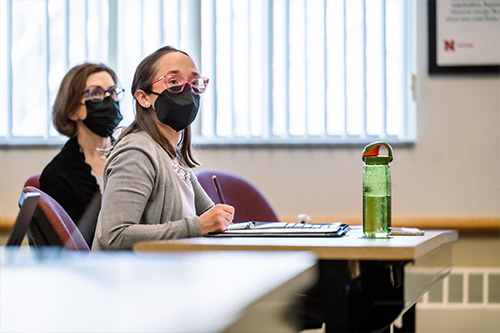Business students at the University of Nebraska–Lincoln partnered with Nebraska Appleseed to increase health care accessibility for Nebraskans through their Health Care Access Program. Through a hands-on project for the Business Policies and Strategies (MNGT 475H) course, students gained meaningful experience helping the local nonprofit increase statewide efforts.
“Students assisted in stakeholder analysis by reaching out to a wide variety of health care providers to help us understand providers' perspectives on barriers to health care. By working with these students, we sought to expand our outreach to even more stakeholders and get students' unique perspectives through their analysis of stakeholder feedback and recommendations,” said Sarah Maresh, program director for health care access at Nebraska Appleseed.
Identifying a diverse pool of health care providers in Nebraska, the students conducted interviews with them about consumer experiences and barriers faced by clients who need care. The students analyzed the feedback looking for patterns and trends. Tammy Beck, associate professor of management, who taught the course, shared how the project bridges the gap between what students learn in the classroom and action that needs to be taken when working in the business world.
“This project connects what they have learned to what they can do. The opportunity to work with a major local nonprofit organization also makes the learning more meaningful, especially since the student teams conducted research and analysis on a topic that the nonprofit organization considered of strategic importance,” said Beck.
Compiling their findings, the students shared their recommendations with Nebraska Appleseed. They included increasing education around insurance plans and coverage for local communities and leveraging telehealth platforms in order to communicate better with rural residents.
“The students were able to quickly grasp our structure, mission and strategies to identify consumer-based barriers to care and develop specific and actionable recommendations about how our organization can incorporate providers' feedback in ways that support our mission. Nebraska Appleseed will use the student's feedback and recommendations as we move to develop and finalize community informed goals moving forward and identify new areas of work,” Maresh said.
The class project also provided students with a deeper insight into the needs and challenges some people face around health care.
 Sarah Maresh, program director for health care access at Nebraska Appleseed, represented the nonprofit, listening to the recommendations presented by students.
Sarah Maresh, program director for health care access at Nebraska Appleseed, represented the nonprofit, listening to the recommendations presented by students.
“I learned more than I ever imagined I would about the health care and insurance industries. I have been privileged to never be concerned about insurance or medical costs, and interviewing these physicians opened my eyes to a world of people who don’t have the same experiences as me,” said Rachel Jendro, ’22, an accounting and finance major from Omaha, Nebraska. “Often in college courses, it is easy to feel like assignments and projects are just boxes to check until graduation comes, but this project felt more meaningful, impactful and appreciated, especially when it came to making recommendations about organizational actions. When the Nebraska Appleseed representative was taking notes during our presentation, I realized how much the project had the potential to positively impact an organization.”
Maresh shared how the information students collected shows both the impact and importance of this project and the work of Nebraska Appleseed.
“We fight for justice and opportunity for all at Nebraska Appleseed, which includes working to ensure that all Nebraskans have access to quality, affordable health care. We know that our communities are stronger when all Nebraskans can get the care they need, but unfortunately, health care can often be confusing, expensive and inaccessible,” she said.
As the students start their careers, Beck noted the lessons learned in the course apply to any business.
“The concepts students learn in this class have application to for-profit organizations, but the concepts also apply to organizations of all sizes and types, as well as to themselves on an individual level. Students are well equipped with knowledge and frameworks that will be relevant to them no matter their chosen career path – learnings from this project will apply to their work life as employees, business owners and/or volunteers within nonprofit organizations,” Beck said.
To learn more about the Department of Management at the College of Business, visit: https://business.unl.edu/management.
Published: June 16, 2022